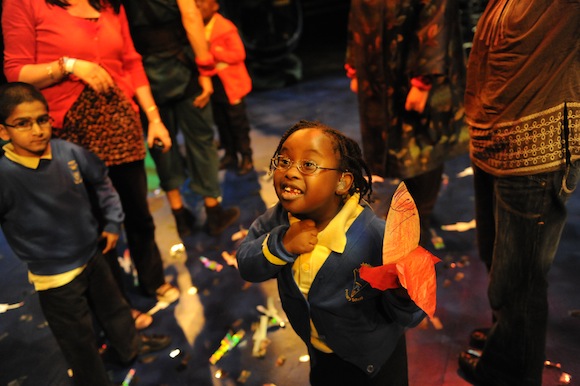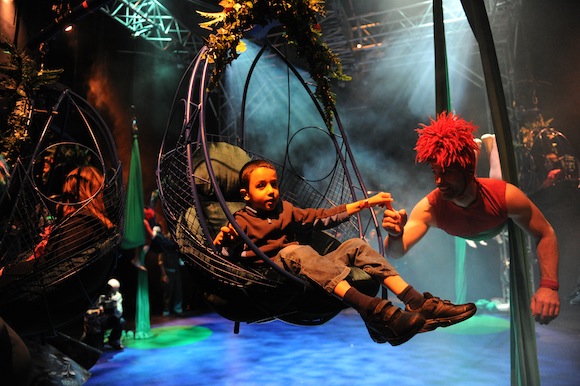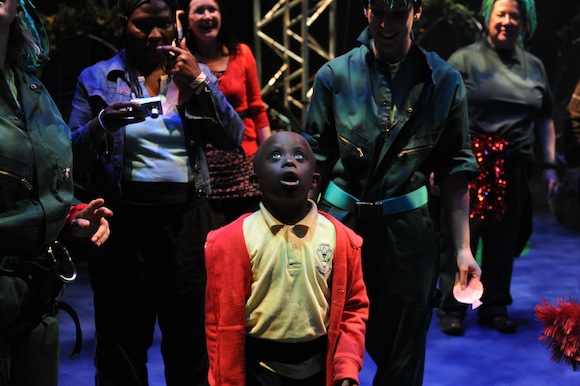
Anger, frustration, embarrassment, guilt and despair. Depending on what unfolds on the stage, the range of emotions you experience at the theatre can be extraordinary. But what if those emotions are triggered not by the actors, but by a fellow audience member, or a member of the theatre’s staff?
This can be the fate awaiting theatre-goers with a learning disability or those who have the temerity to attend a show with someone who happens to have a learning disability, as the father of autistic 12-year-old Gregor Morris found to his disgust earlier this year.
I had an unpleasant experience when I took my sister to a West End musical, although our shoddy treatment was at the hands of small-minded fellow punters, not any members of staff.
Something similar happened when four-year-old James Geater from West Sussex went to the Theatre Royal Drury Lane in London in August. As James’ mother Karen said at the time, James is part of society and children and adults are losing out through no fault of their own – and Gregor’s and James’ stories are only those that have been reported.
As for the family of Gregor Morris, they took their campaign to the internet, and now they have more than 4,100 supporters on Facebook. Earlier this week, their awareness-raising drive, backed by the National Autistic Society, culminated in a major event at London’s Unicorn Theatre. The day-long forum, Autism and Theatre: An Industry Inspiration Day, brought together theatre staff and autism experts.
It was apt that the Unicorn hosted the day; it specialises in theatre for children and young people and has long been an inclusive and accessible arts venue with autism friendly performances.

The event was a partnership between the Ambassador Theatre Group (the largest owner of theatres in the UK – making great amends as owners of the theatre Gregor Morris was ejected from), the Unicorn Theatre, National Autistic Society, Action for Children’s Arts, Theatrical Management Association and the Society of London Theatre.
The hope, say organisers is that the event will create “long-lasting cultural change” and help spread the word about existing access work in the theatre industry. They hope to spark similar awareness days regionally and lead to better interaction between local venues and families affected by autism.
I wasn’t at the event but apparently around 200 theatre industry types attended to learn more about autism, hear from the families affected by access and inclusion issues and discuss best practice. Actor Jane Asher, president of the National Autistic Society spoke about the fact that simple adjustments in theatres could boost access while training staff can also make a huge difference.
There are, of course, various initiatives to make the arts more accessible, the Autism Friendly Films project is just one. The Unicorn Theatre has pioneered sign-interpreted and autism-friendly screenings and performances.

Unicorn staff get autism awareness training and performances feature smaller audience sizes and a chill-out room with activities for anyone who needs some time out. A “familiarisation visit” is available the night before a show, to reduce anxiety and stress for first-time theatre-goers (this, I think, is utter genuis – and so simple and inexpensive for other venues to adopt) and the theatre has a dedicated access manager. This weekend sees the latest access-friendly show, Billy the Kid and the venue is also hosting the Art for Autism exhibition that I’ve blogged about before.
While the mind boggles as to why this kind of large-scale theatre industry event hasn’t happened before and why it took pressure from a parent campaigner to mount, it’s better late than never. The great practice and partnership that exists needs to be widely shared, so the work of the most accessible and inclusive venues trickles down regionally and locally, reaching beyond the big towns and cities that boast the biggest venues.
If the theatre sector debate translates into visible action, people with learning disabilities and their families can see shows they love without paying through the nose for a half empty box, going out of their way to attend midweek matinees which tend to be less busy and therefore often less stressful or – worst of all – having to leave before the end, either by request or because they feel unwelcome.
And more accessibility combined with a welcoming and understanding attitude should make commerical sense in theatreland. The economy might be suffering but the Society of London theatre estimates that box office takings totalled half a billion pounds last year, so there’s a bums on seats reason to attract more and younger theatre-goers into the auditorium (staff just have to be prepared for the bums to defy convention and to wriggle on and off seats during the performance).
I’m eager to see how this week’s event is followed up although I wonder if the organisers missed a trick when they tagged the day only on autism. While those with autistic spectrum conditions can require very specialised care and a unique, tailor-made approach, I’d hope that theatres can appreciate the needs of all of those with special needs, many of whom don’t necessarily have a label for what makes them different.
It’s a niggling point however, and if the event fires debate and pushes theatreland to develop a more consistent approach to its treatment of all audience members, then what matter? It’s worth noting that event co-chairman Jonathan Meth, a theatre consultant, arts tutor at Goldsmiths, University of London, and parent trustee at Ambitious About Autism, acknowledged the need to broaden the debate’s remit, saying after the event: “While the day was focussed on those with autistic spectrum conditions, we hope it was both an inspiring and practical day for all those who want to make the experience of different people coming into their theatres an excellent one.”
The other side of the theatre access and inclusion coin involves seeing more actors of all abilities onto the stage. A combination of user-friendly theatres and more integrated performances would support the kind of cultural shift discussed at the Unicorn earlier this week. How can people who behave, sound or move differently or don’t look quite like “us” be fully welcome in an audience that has never had the chance to see them perform?
I’ve blogged before about the great work of Heart n Soul, for example. On a more general disability arts tip, I’ve also just been reading about the work of another group, Accentuate, supporting projects encompassing the arts, culture and sport to change the way disabled people are viewed, the project is hooked on the Paralympic Games.
When I heard about the Autism and Theatre event, I was reminded of the innovative work of Speakeasy Theatre Company, which aims to integrate actors and audiences of all abilities. The simple words of artistic director Andy Reeves on a recent piece of work could be a motto for the companies that run theatres: “Our goal is for everyone – disabled, non-disabled, young, old – to come out with a smile on the outside and a warm feeling inside.”
A well-known playwright once compared life to a play. If all the world was a stage, movement between the two might be more fluid, giving us a better chance of reflecting society’s many facets on the stage and in the auditorium.
* The Facebook campaign and debate sparked by Gregor’s experience is at www.facebook.com/groups/greenwicked
* All images of Something in the Air at the Unicorn Theatre, London, by Alastair Muir
* Click here for information about the Unicorn’s current accessible performance, Billy the Kid and here for information on the Art for Autism event.

Thank you for this insightful article Saba, and I’m sorry to hear about your sister’s negative experience. The event here on Monday (‘Autism and Theatre – An Industry Inspiration Day’) was a partnership between (amongst others) ATG, SOLT/TMA, ACA and the Unicorn and was attended by venues from across the country, big and small. The response was incredibly positive and I hope we will see many more integrated and accesible performances being piloted across the country. Hurrah and onwards!
Thanks Kirsty for the comment and for sharing the theatre’s work on the blog, look forward to seeing the positive fallout from Monday. The look on the faces of the children in the Unicorn pictures says it all, v uplifting.
Great article, Saba, and also very interesting to hear your own first hand experience of what it can be like, from what should ultimately be an enjoyable experience in a relaxed environment. We’re very lucky with our son, Gregor, 12, who has a condition called Neuronal Migration Disorder and is on the Autistic Spectrum. We’re lucky in the sense we don’t have behaviour issues with him, but quite the opposite in fact, with his infectious smiles and laughter, he enlightens many faces he comes in contact with. He is non verbal but his comprehension is excellent. He ‘sounds vowels’ in order to communicate and this, by no means, is involuntary. This was the first time we had been in this situation and this is what made it the hardest as we take him everywhere as a family, including many previous theatre trips. I’m sure there have probably been many, who have built up the confidence to at least try a visit to a theatre and if treated the way Gregor was, would end up ‘once bitten, twice shy’, never to return. In our case, it certainly wasn’t the audience, as not one single complaint came from them, in fact, one even fought our corner on the night with others phoning in during the live radio interviews to defend us early on in our campaign. It simply came down to a bad judgement call, which left us no alternative but to leave – which was wholly unacceptable.
A few days later, on our return home, the Facebook Page ‘Wicked Discrimination’ was born and attracted, in just 3 weeks, a massive support network of over 4000 members, playing an important role in enabling us to have arrived at where we are today. Aim – to raise awareness and better understanding faced by individuals with additional needs, and their carers in society, primarily focusing in this case, theatre. Of course the irony behind the story line of the musical which we attended was astonishing. I was always adamant this was going to be a positive campaign, far from the ‘blame culture society’ we so very often hear about, and what better way to promote this than addressing the shortcomings of a sector whose main focus is all about ‘expression’. I feel, whether it is audience, production, or theatre staff themselves at fault, we owe it to far more individuals than just us, going by the hundreds of emails received to date, referring to similar stories. One story that especially sticks in my mind was a case where the teacher of a mainstream class asked theatre staff to remove a class of additional needs, and said, ‘if they don’t go, we will’. The outcome was the teacher from the mainstream class pulled the class from the theatre and left.
Background aside, we have in essence, ‘got the industry talking’, and going by the up-take of industry audience on the day of the conference, it would seem to have been very much welcomed. The response, I’m glad to say, was simply overwhelming. We need to find the answers to difficult questions and in creating an industry only conference, wanted to create a relaxed environment for them to openly participate. It’s truly amazing what’s been achieved in a short space of time, and this is only the start of what’s hoped for the proposed regional events taking place next year, opening up to public debate.
I am obviously passion driven because of our own circumstances. Autism plays a large part in our family, as with the various other complex needs Gregor has to deal with, but I have always backed and stood behind the inclusion for all additional needs to be addressed, and still stand by that.
It’s all very well talking about ‘setting the stage for social inclusion’ and let’s face it, it is going to take time. A huge thanks must go to the partner organisations, as mentioned, and especially The Ambassador Theatre Group for their huge support. We are witnessing a refreshing, head-on approach, with willingness, open mindedness, passion and vision to ensure the goal to which we’re all looking, is brought to light, used to the maximum effect and most importantly, made to be sustainable.
Who knows what path this will lead to, but what whatever laws that already exist to protect these kind of scenarios happening, we have in our grasp something we must put into practise. We are already seeing fantastic examples of inclusion, from the simply inspiring work of The Unicorn, to ‘Autism friendly’ shows recently on Broadway. Even small changes can have a hugely beneficial impact such as more information given, from production to theatre and made available on their website, including advanced warning of loud noises, intervals, etc., pre-visits to theatre and the use of ‘social stories’. Maybe, it’s even time to change the mainstream theatre from the ‘neurotypical’ stereotype views of a ‘sit-down-and-shut-up’ environment to a far more inviting and relaxed experience for ‘everyone’, from what theatre originally started out as with the emphasis on audience participation. Time will tell.
All in all, it’s exciting times ahead and I just feel so privileged to be at the heart of it.
Follow the WD Facebook page on http://www.facebook.com/groups/greenwicked
Glyn, I await the end to the “sit down and shut up” school of audience participation and salute your fantastic campaign in the meantime. Looking forward to featuring a follow up on these pages. As you say, last week’s event was a hugely positive start and highlighted the good work that’s already going on – we just need more of it! Thanks for taking the time to comment.